By David M. Brown
Composting has become quite the buzzword in recent years and has become increasingly popular as people look for ways to reduce waste and help mitigate disastrous levels of methane gas caused by rotting food scraps in landfills. Last month, we took a look at residential composting and Mill’s partnership with Arizona’s R.City. In the final installment of our two-part series on composting, we’re diving into the world of commercial composting to explore the efforts that large companies are making to close the loop on food waste.
Denali, the nation’s largest full-service organics recycling company, has processed and recycled more than 2.6 billion pounds of commercial food waste into compost and animal feed since 2021.
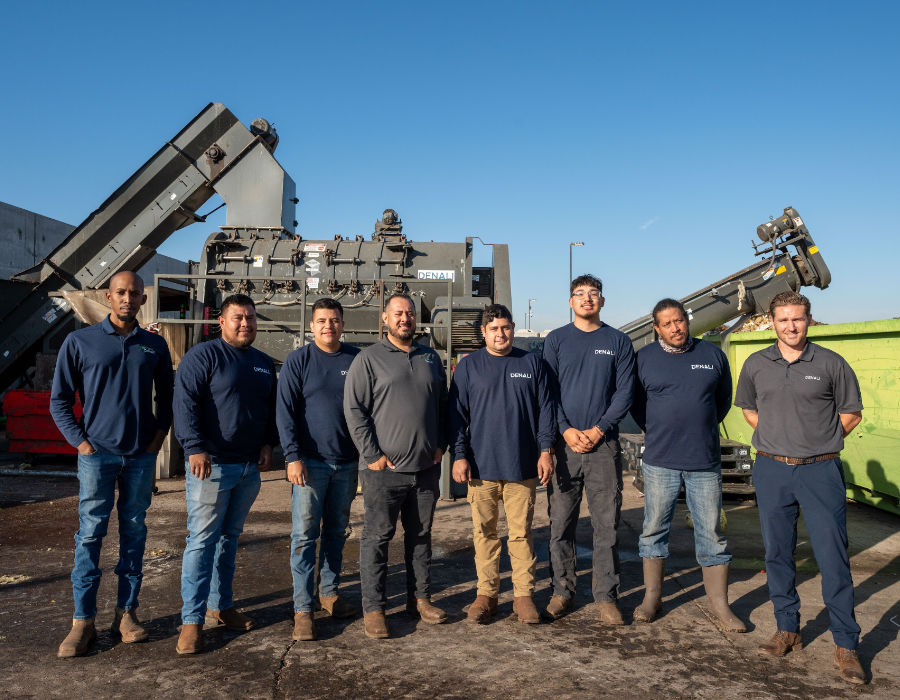 Opened in April 2017 next to the the City of Phoenix transfer station and recycling facility at 27th Avenue and Lower Buckeye Road, Denali’s Arizona-based location has been designed to process as much as 220,000 tons of compost each year. The product is then used as a soil amendment for farms and gardens.
Opened in April 2017 next to the the City of Phoenix transfer station and recycling facility at 27th Avenue and Lower Buckeye Road, Denali’s Arizona-based location has been designed to process as much as 220,000 tons of compost each year. The product is then used as a soil amendment for farms and gardens.
The 27-acre site — including office spaces, a break area, a maintenance building, and a water-retention basin — is on the city’s Resource Innovation Campus, which works with innovative companies like Denali to strengthen the circular economy and develop sustainability solutions.
Samuel Liebl, director of communications for Denali, explains that the company collaborates with thousands of U.S. grocery stores including 4,700 Walmarts, food manufacturers, cities and towns, hotels and restaurants, schools and universities, healthcare companies, and sports and entertainment venues. They partner with farms, which convert nutrient-rich residuals into fertilizers, to reduce farmers’ dependence on chemicals. With locations nationwide, the Russellville, Ark.-based company has grown through nationwide acquisitions and now employs 1,500 associates.
“We recycle organic byproducts from these industries and convert them into valuable products such as feed, fertilizer, and biofuel,” he says. Denali is one of the largest producers of feed for cattle from agricultural byproducts and food waste and operates one of the largest biodiesel manufacturing facilities in California, producing about 12 million gallons annually. Much of the used cooking oil for that fuel is sourced from Arizona, he adds.
By diverting and turning unused food destined for the landfill into valuable products, in the past two years, Denali has collectively helped to avoid the creation of more than 500,000 metric tons of greenhouse gas emissions, including landfill-produced methane. Based on the U.S. EPA’s calculation tools, this is equivalent to keeping approximately 100,000 cars off the road for one year or providing electricity to more than 60,000 homes for one year, the company says.
“We are on a mission to replenish the Earth by repurposing waste. Our work is essential to keeping water clean, reducing the need for new landfill capacity, building soil fertility, helping farmers be more resilient and reducing society’s reliance on fossil fuels. Our services and products touch thousands of acres, hundreds of locales, millions of tons of material — and nearly every person who purchases and consumes food in the U.S.,” reads a July 2023 statement from the company.
Recycling Alchemy: Green Waste to Black Gold
The Denali facility uses a state-of-the art Turned Aerated Pile composting system that generates large amounts of compost in almost half the time as traditional methods. Workers are on site for three shifts six days a week.
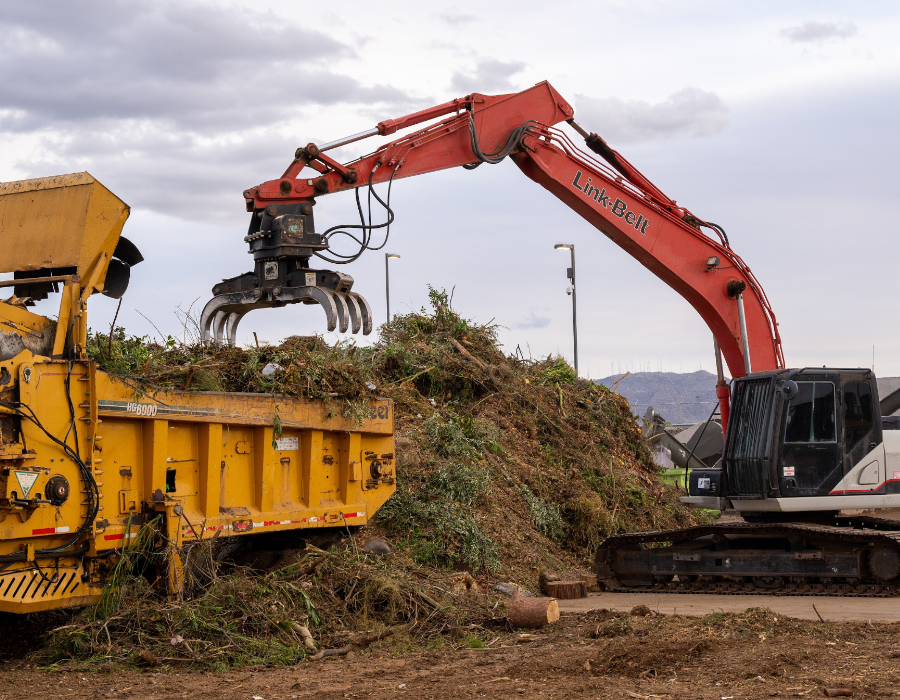 Here’s how the TAP works. First, Denali schedules trucks throughout Arizona that pick up the organic waste from hundreds of grocery stores, healthcare facilities, sports events, and even event venues run by Live Nation. The drivers maintain routes. For instance, one covers Flagstaff, another the White Mountains or Tucson. Nationwide, the Denali fleet includes about 1,000 trucks.
Here’s how the TAP works. First, Denali schedules trucks throughout Arizona that pick up the organic waste from hundreds of grocery stores, healthcare facilities, sports events, and even event venues run by Live Nation. The drivers maintain routes. For instance, one covers Flagstaff, another the White Mountains or Tucson. Nationwide, the Denali fleet includes about 1,000 trucks.
For organic green materials like grass, palm fronds, and tree stumps, Denali collects the raw material or it is dropped at the facility, explains Blake Ludeman, vice president of sales for Denali. Landscaping businesses pay the city by weight to dispose of the material, which would otherwise be landfilled. Once delivered at the site, all material is arranged in specific sorting areas: green waste, food waste, and already separated organics. This equates to about 90 to 100 tons daily. At the 27th Ave. facility, the Denali team efficiently completes the composting process in 45 to 60 days. Traditionally, quality compost can take from nine to 12 months to produce, says Ludeman.
Next, Denali associates wielding hand-held pickers remove the contaminants from the green waste, such as plastics, glass, and metals. In this way, both the expensive machines processing the material and the quality of the final compost are not compromised. About 95% of the material collected — that once piled up at landfills — can be repurposed by Denali.
“Right now, about 5% of the non-organic material we see here is still going to the landfill,” Ludeman says. “Technology is not there yet for us to repurpose everything, but we’re getting there.”
In the next step, an excavator feeds the green waste into a grinder which outputs material six inches or smaller. Workers pile this into long separated windrows, making them accessible for trucks and other equipment for individual treatment during the meticulously controlled compost process. While California has already mandated food waste collections, Arizona and most other states have not.
“Here, the stores are doing it from a sense of conscience,” Ludeman says. “They want to do what’s right.”
Next, the food waste from grocery stores, their warehouses, and other locations, is added to the piles, creating what he compares to a compost smoothie. The organic material adds nutrients and moisture, which help break down the piles for quality compost.
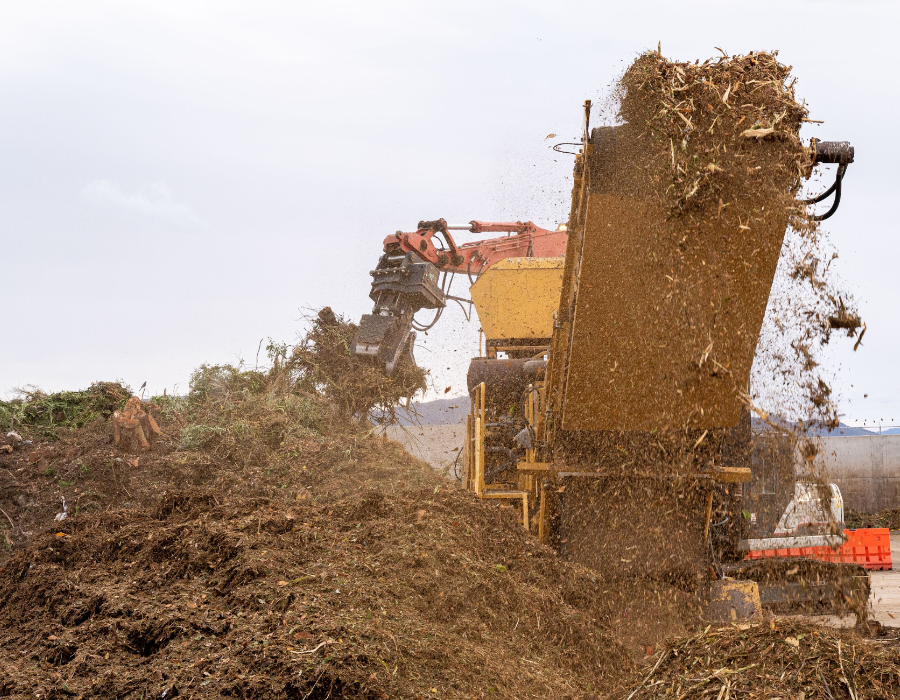 Throughout the process, Denali associates apply water to the piles to cool them and pump air in, called positive aeration, then remove it with negative aeration. The ideal monitored temperature ranges from 145 to 160 degrees Fahrenheit, he says. The removed air is piped to a biofilter, which reduces odors and accelerates the composting process.
Throughout the process, Denali associates apply water to the piles to cool them and pump air in, called positive aeration, then remove it with negative aeration. The ideal monitored temperature ranges from 145 to 160 degrees Fahrenheit, he says. The removed air is piped to a biofilter, which reduces odors and accelerates the composting process.
Excess water and rainfall flow into a retention basin where skimmers vibrate and circulate the nutrient-rich content. This water is then returned to the compost piles, where it furthers the decomposition process.
“Nothing is wasted here,” Ludeman says.
Throughout the process, Denali monitors the heat, air, and water flow for necessary adjustments. An agitator mixes the composting material. Next, a trommel sifts out the finer material from the larger material which is then re-treated in a Hurrifex machine, which further grinds it down to a size of two inches or less while screening out remaining contaminants such as stones and plastics. The mix is then further cured and sent to a third-party tester to ensure it meets or exceeds industry standards.
Once certified, the completed fine-textured compost is sold to soil blenders, who make bagged products for retailers such as Home Depot and Lowe’s. Ludeman calls the finished compost “black gold” — the highest and best use for the material.
A Food Waste Recycling Bin in Our Future?
Denali is the future of recycling.
With innovations in the recycling industry, Denali predicts the amount of waste avoided will grow immensely over the next five years, and with it the demand for food-waste repurposing.
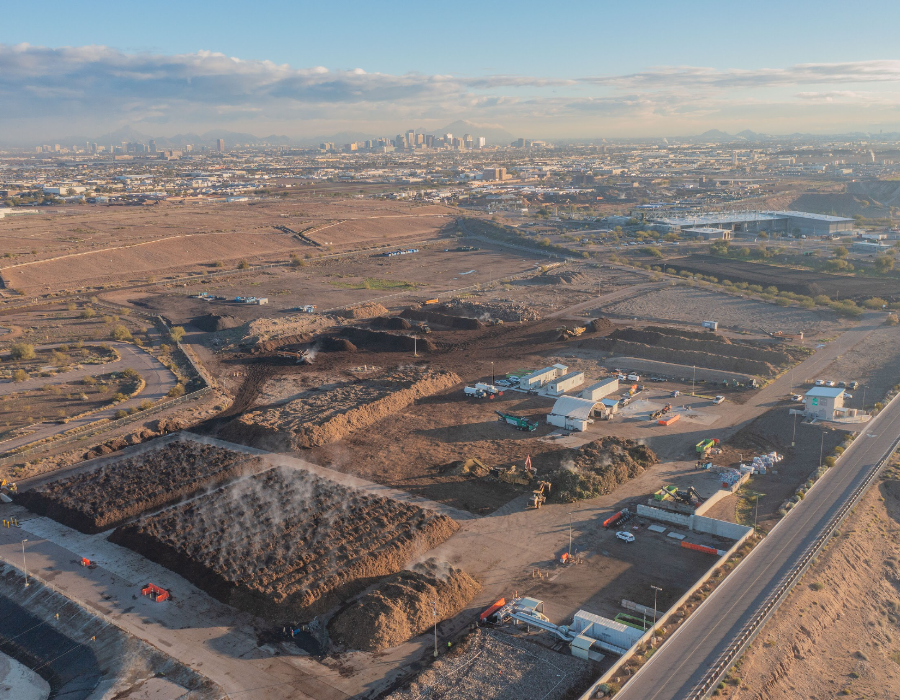 Eduardo Rodriguez, deputy director of the Phoenix Public Works Department, says, “Because of our partnership with Denali, we have some of the most innovative machinery that can pull out the majority of inorganic contaminants from the food waste it processes. Because the operation of our facility is in good hands, we can focus on collecting food waste from schools and from major events… Not only does the composting operation provide a quality product for us, but it also helps us reach our goal of becoming a zero waste city by the year 2050.”
Eduardo Rodriguez, deputy director of the Phoenix Public Works Department, says, “Because of our partnership with Denali, we have some of the most innovative machinery that can pull out the majority of inorganic contaminants from the food waste it processes. Because the operation of our facility is in good hands, we can focus on collecting food waste from schools and from major events… Not only does the composting operation provide a quality product for us, but it also helps us reach our goal of becoming a zero waste city by the year 2050.”
Susan Thoman has served 30 years as a solutions strategist in the environmental and sustainability field and is managing director of the Compost Manufacturing Alliance LLC, a Seattle-area-based partnership of compost manufacturers and third-party certifier of compostables.
In communities across the U.S., Denali has followed the hierarchy established by the Environmental Protection Agency to prioritize feeding animals before reprocessing food for composting, she says.
“Without their investments in the industry, it becomes more challenging to realize the significant environmental benefits of diverting organics from the landfill to animal feed and composting,” she notes.
“These programs create some of the most impactful steps a community can take to mitigate the effects of climate change, improve plant health, filter out silt and chemicals from our land and waterways, and improve ecosystems, landscapes, and gardens by adding natural nutrients, biology, and structure to the soil,” she adds. “Their role expands the possibilities for better daily practices in composting food scraps and yard clippings while teaching about the benefits of applying compost to improve our communities.”
Everywhere he goes, Ludeman sees rising interest in repurposing food waste. Companies incorporating the strategy can proudly report their efforts to shareholders. Stores can better their diversionary food-waste goals, and sustainably minded consumers may be incentivized to attend public events if they know they’re produced with the environment in mind. Even property management companies may soon be unable to meet increasing expectation levels associated with luxury living without including food-waste recycling service as part of amenity packages.
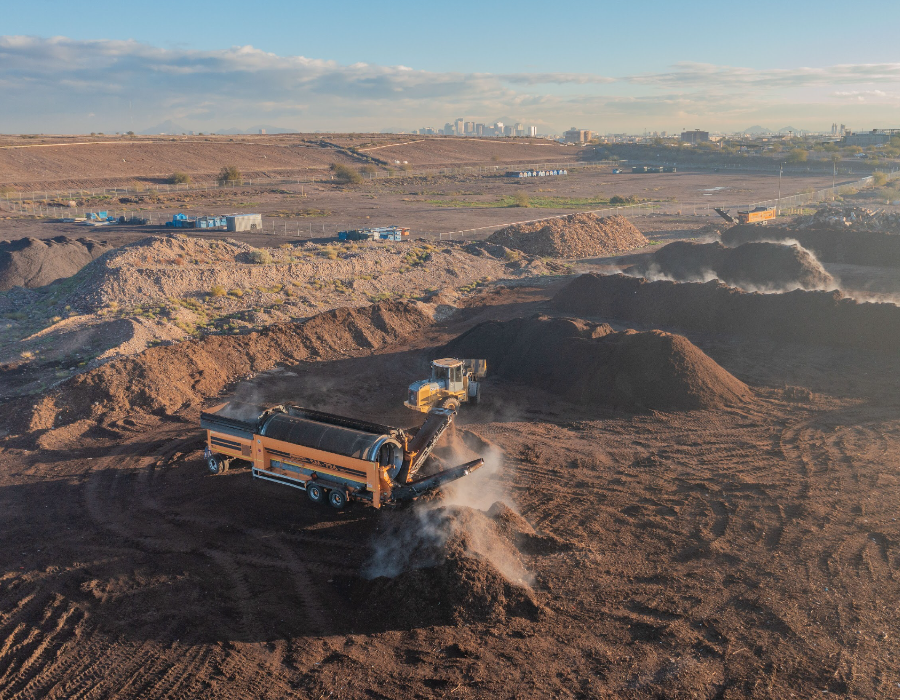 Decades ago we accepted green recycling; today a food-waste recycling bin may be in the near future.
Decades ago we accepted green recycling; today a food-waste recycling bin may be in the near future.
“I’m seeing people at concerts and sports events dump their food off for compost and then their plates,” Ludeman says.
“Our landfills don’t have the room; that system is antiquated,” he adds. “There’s no reason to throw all of that organic matter away after all of the effort has been put into it: the water, the labor, the land, getting it to the warehouse. It’s ridiculous. But with food-waste recycling, everyone wins — especially our environment.”







